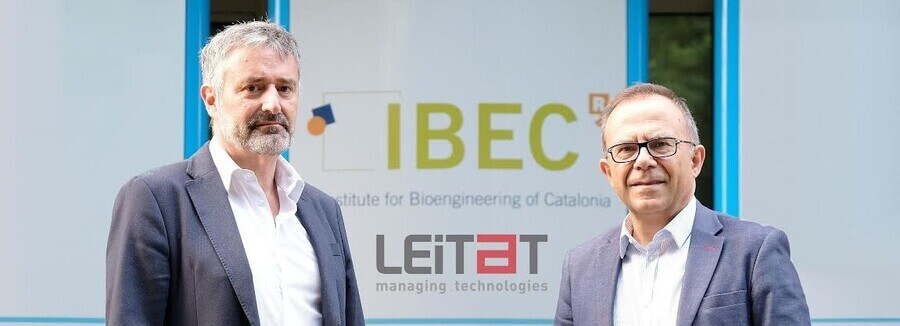
LEITAT and IBEC will promote last generation biotechnologies based on an Open Lab ecosystem
A recent alliance between the LEITAT Technological Center and the Institute for Bioengineering of Catalonia (IBEC), based in the Barcelona Science Park, will give a new impulse in the development and application of cutting-edge technologies that will combine engineering and biology to find solutions to health problems. Both institutions have established a new agreement to promote innovation in different scientific and technological areas, including 3D bioprinting with bioinks.
The new agreement is the result of years of collaboration that combines the leadership of both institutions. Leitat, as a reference center in the management of technological knowledge generation and with an important commitment to the health area, and IBEC, an international reference in research of excellence in bioengineering aimed at contributing to solutions for health. This agreement aims to offer new solutions and innovative opportunities for the growing needs in different scientific areas.
Open innovation and 3D Bioprinting
The offer of complementary technology and knowledge between the two partners establishes a great alliance that will support future scientific-technical growth in Barcelona and Catalonia, based on an ecosystem of innovation and scientific creation (Open Lab) that is already applied in countries such as the USA and Norway, and in Spain with IBEC as pioneer.
The concept is based on an open creative space, in which researchers from both institutions can collaborate with other institutions or companies from different sectors, for the improvement and maturation of different technologies derived from common development activities. In this environment, joint participation in international innovation initiatives and programs such as those included in the new Horizon Europe or Health Program will be promoted and favoured.
This alliance will also serve as an instrument to develop joint research units for proof-of-concept projects that will take advantage from the common technological capabilities, enriching teams and equipping them to face new challenges. Ultimately this would allow and guarantee the acceleration of marketable projects, technological services for health and innovative methodologies in bioengineering.
3D bioprinter
One of the areas of common strategic interest is the development of bioinks for bioprinting and 3D models. Bioinks contain mainly cells, but also other biological components and biomaterials, necessary to generate three-dimensional structures similar to human tissues, through the use of 3D bioprinters. Currently, it is already possible to print, for example, cartilage and skin with this technology, which could be used to treat patients who have suffered injuries or some diseases, or simply the wear ageing effects. In the future, this technology could even be used to replace patient organs.
Beyond the availability of a clinical alternative, this substitute could reduce the possibility of rejection compared to traditional organ transplantation and would contribute to increasing our therapeutic arsenal and guaranteeing the immediate availability of “spare parts” for our body.
Advances in 3D printing in recent years have been extraordinary, reaching a greater importance in multiple industrial sectors for various cutting-edge applications, and establishing itself as a fundamental pillar of the so-called factories of the future, based on digitization and the use of 4.0 technologies. Biomedicine has been exploring the use of this technology for the clinical setting, bringing great advances.
In this way, the collaboration of two widely consolidated R+D+I partners, such as LEITAT and IBEC, will allow the development and optimization of a wide spectrum of bioinks produced in clinical grade, suitable to favour the development of new lines of research that will transform the world of transplantation and regenerative medicine, as we understand it today.
At the same time, this alliance will help consolidating Barcelona as a pole of attraction for biotech companies, start-ups or big pharma that want to take advantage of this ecosystem.
“With this collaboration, we want to obtain therapeutic solutions that significantly improve the life quality of people who need transplants, and in the future, new functional organs for an increasingly long-lived society”, explains Dr. Esteve Trias, Medical Director of Leitat.
“By combining the best bioengineering with industrial development, we can offer new tools to move towards solutions to health problems”, states Dr. Josep Samitier, Director of IBEC.




